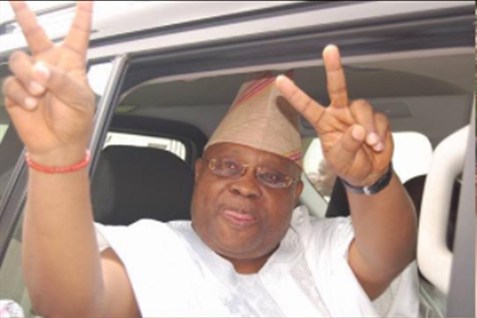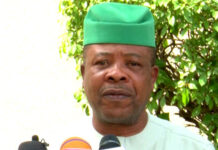By Ishaya Ibrahim
Senator Ademola Adeleke, also known as the dancing-senator, can now be called the dancing-governor, although he has one more hurdle for him to attain that status.
On March 22, the Election Petition Tribunal sitting in Abuja declared him as the validly elected governor of Osun state.
The road to his victory was full of bumps and hurdles.
Forty-eight hours to the Osun Stae governorship election which held on September 22, 2018, the police declared that he would be arraigned for examination malpractice during the National Examination Council (NECO) of June/July 2017. It took the intervention of President Muhammadu Buhari to stop the police from taking that action. He was later arraigned after the election.
After the election, the Independent National Electoral Commission (INEC) announced that Adeleke polled 254,699 votes while his closest challenger, Gboyega Oyetola of the All Progressives Congress (APC), had 254,345 votes. But because Adeleke’s margin of lead, which was 345, was less than the cumulative cancelled votes in seven polling units, the INEC ordered for a supplementary election in those polling units.
The supplementary election was fixed for September 27, 2018, in the affected seven polling units for the two leading candidates – PDP and APC.
The APC enlisted the support of the Social Democratic Party (SDP) candidate, Iyiola Omisore for the supplementary poll as some of the affected polling units fell in his Ife South and Central strongholds.
At the final ballot, the APC’s candidate, Oyetola overtook the PDP. His totally score became 255,505 votes to beat Adeleke who scored 255,023 votes.
Local and foreign observers decried the supplementary election as fraught by malpractices. The President was later quoted as saying that the APC won by ‘remote control’ when he was addressing Osun State, traditional rulers.
“I know how much trouble we had in the last election here. I know by remote control through so many sources how we managed to maintain the party (APC) in power in this state,” the President said.
The battle then moved to the Election Tribunal. The PDP and Adeleke filed a petition asking the tribunal to declare that Adeleke polled the highest lawful votes and should be declared the winner.
The three-man tribunal, after hearing testimonies of what transpired during the election and examining documents, decided that the supplementary election held by INEC in the seven cancelled units on September 22, 2018, was null and void.
The tribunal ruled that the Returning Officer who cancelled the results had no power to do so. It, therefore, ruled that the winner of the election was Adeleke.
The APC has already said it would appeal the ruling. Until the appeal is exhausted, the dancing-senator will have to tarry a bit to know if he will eventually become the dancing-governor.















